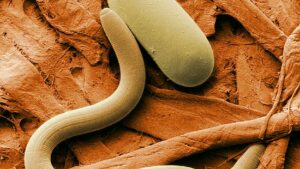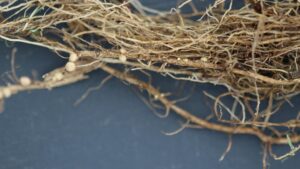On yesterday’s episode of Seed Speaks, three experts on DNA revealed fascinating insights into how DNA and related technologies are changing the face of agronomy.
Geneviève Arsenault-Labrecque is co-founder of AYOS Technologies in Quebec. AYOS has developed a molecular test that uses genetic markers to identify quickly and precisely which variants (pathotypes) of Phytophthora root rot are present in a growers field, so that proper resistant varieties can be used in the following year to fight the disease.
Phytophthora root rot is one of the most prevalent diseases affecting soybean crops. In North America alone, it causes annual yield losses of nearly $500 million. The use of resistant soybean varieties is recognized as the most effective method of combating this disease. However, new variants of the pathogen can rapidly overcome resistance genes, so it’s essential to know which variety to choose, based on a precise knowledge of the variants present in a given field.
This choice of a resistant variety will allow a producer cultivating 200 ha of soybeans to avoid yield losses averaging $30,000 each year. The technology will further eliminate the dependence on chemicals used in seed treatment as selection of the proper resistant variety will protect the plant from the seedling stage to full maturity.
“With this test, we can undeniably lower the pressure that Phytophthora root rot puts on soybean production in Canada. I think we can also reduce significantly the population level that is found in the soil by using the right varieties year after year,” Arsenault-Labrecque said.
“But for us, what is important for us is that we know that we will be able to preserve for a longer time sources of resistance that are carried by soybean varieties that have been developed through important breeding efforts. It also helps promote a method to curb the disease that is sustainable for the environment and eliminate the dependence on chemical input.”
DNA has resulted in many new testing innovations like that offered by AYOS Technologies. To the west in Alberta, 20/20 Seed Labs is the first commercial lab in Canada to offer a DNA-based diagnostic test able to detect SCN in soil, plant roots and seeds. This testing method provides an absolute identification of SCN and detection of even low levels of egg, cyst and motile forms.
Early detection and containment are key to minimizing current and future losses to SCN. This test provides a needed tool for Canadian seed growers and producers to avoid SCN transfer between fields with planting seed or machinery and monitor the effectiveness of resistant varieties. Its applicability to root tissues is also helpful for breeders involved in developing SCN-resistant varieties.
“I think we can actually get to the point that we can might be able to live with it and manage the yield losses associated with SCN. The old test that was available for SCN was actually developed in an area where a lot of it was already present, so it desperately needed an update because it was missing a lot of the earlier life stage forms, or the dormant life stage forms, because it was really primarily focused on the living motile forms of the pathogen,” Kenward said.
“In designing this test, our task was basically to try and increase the sensitivity of the capability of detection so that we can spot it at an earlier stage. If we can spot it at an earlier stage, then we can actually see it as a potential problem before you start seeing large yield losses. Ultimately, what I would really like to see is soybean in particular becoming a much better and stronger crop option for more areas of Western Canada, so that farmers have another choice in terms of what they can grow.”
Of course, seed testing isn’t the only area where DNA is changing the face of agronomy. NRGene, based in Israel with its Canadian office located in Saskatoon, Sask., developed SNPer as a customized genotyping solution in which genotyping and imputation are optimized within an individual breeding program to maximize the genetic data gained from a minimal number of SNPs genotyped.
The informativeness of the genetic data translates into higher prediction accuracy while the cost is greatly reduced. This technology is critical to the industry as many companies perform genotyping as part of their breeding program, and by using NRGene’s technology, such companies can develop and release new elite varieties faster to the market.
“We believe that our technology will enable seed companies that develop new varieties to have more tailor-made niche varieties that different farmers in different geographies with different cultivation protocols can use, enabling them to have more options better suited to their needs, according to a DNA test that we provide,” Ronen said.












